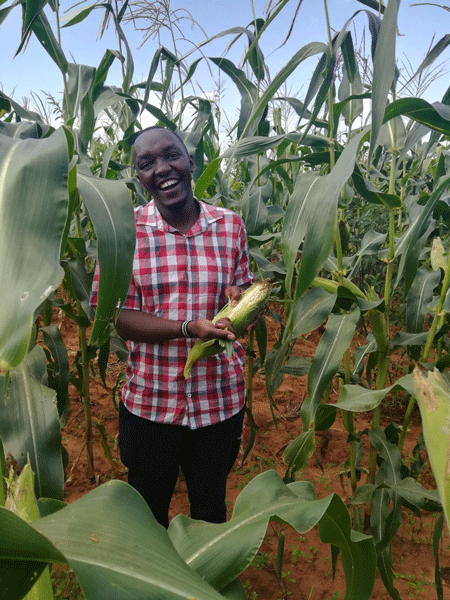
Farming with ‘Daktari wa Udongo’
Agronomy as explained by Ian Mutua encompasses a number of practices which are all aimed to improve farmers’ productivity. This practices in particular revolve around soil health and plants. From use quality certified seeds to building on soil health, soil test leaf analysis all the way to fertilizer recommendation rates.
Ian’s role at CropNuts as an agronomist is to ensure that his clients do farming with as much information as possible. To get this information to the farmers, he is working through the ‘Daktari wa Udongo’ (Swahili, literally translation of a soil doctor) initiative which guides them on best practices for maximum yields.
The process starts with the curious farmer reaching out, which eventually ends with a trained Cropnuts ‘Daktari wa Udongo’ agronomy agent collecting the sample.
There are specific tests under the program tailored for the Starter farmer. This normally includes the Nurtient test, Pathology test, Nematode test and in cases where irrigation is done an Irrigation water test.
A small scale farmer will usually start with the nutrient test- a complete soil analysis or a basic soil analysis and graduate to the second one once they see results from the first trial. Once the results are out, the farmer will get an SMS message on her phone or email with the report. The agent who collected the soil sample will then goes and explain the report to the farmer. This will often involve advice on what to rectify and how to treat the soil for optimal yields.
“Soil correction often involves use of Lime, gypsum, manure or rock phosphate basically to bring in nutrient balance in the soil, work on acidity soil aeration and drainage. Nutrients constitute elements like nitrogen, phosphorus, and potassium. These nutrients play specific roles in plants from growth reproduction all the way to disease resistance”, says Ian.
Nitrogen is a major component of plant chlorophyll, amino acids, protein, and plant DNA. Phosphorus is an important nutrient for photosynthesis, respiration, energy storage and transfer, cell division, cell enlargement, and other processes in plants. Potassium is important for most plant processes that sustain growth, reproduction, plant protection, and crop quality. Fertilizers are used to supplement these essential plant nutrients to promote optimal production.
“It is best to focus on the 4R’s of fertilizer application: applying the right fertilizer, at the right time, in the right place, and at the right rate. This is where the soil analysis report comes in handy as it will give quantities to be used,” Ian continues to say.
Soil testing is important because through it the agronomist can recommend types of crops to be grown, tillage methods, drainage and irrigation techniques as well as fertilization, among many other considerations that will affect productivity.
Soil testing is Key in any farming system. Acting as a guidance for farmers to accurately and correctly use what is needed for their farms. Providing data that will assist farmers to better understand their soils and nutrient requirements for their crops.
Soil testing involves the physical classification of soil on grid formation. It also touches on soil map and crop-specific production potential. It covers soil properties and their management as well as precision farming maps. There is more to it than just taking a sample for analysis and giving recommendations. Agronomy also touches on precision farming.
Precision farming is gaining popularity as it reduces on wasteful application of fertilizers, water and pesticides. In addition to cost implications, overuse of these resources is also damaging to the plant and the environment. On the other hand, an underuse of these same resources results in lower yields in the long-term and contributes to a wastage of labour resources as more people will be hired again to bridge the gap left by the under-application of resources.
To better utilize resources, some farmers are turning to mechanization of the farming processes. Some farmers are using global positioning systems (GPS) and GPS-computer guided farm equipment like tractors and harvesters. Precision farming practices may also include: electromagnetic soil mapping, soil sample collection, crop yield data collection, aerial imagery, crop or soil color index maps, soil types, soil characteristics, drainage level and potential yields.
According to Ian, there is a challenge in the access to quality services for farmers as some will be given misguided soil analysis reports from unqualified masquerading personnel. The plant pathology graduate holds a Bachelor of Science degree from Kenyatta University and has been working with Croupnuts for the past 2 and half years.

